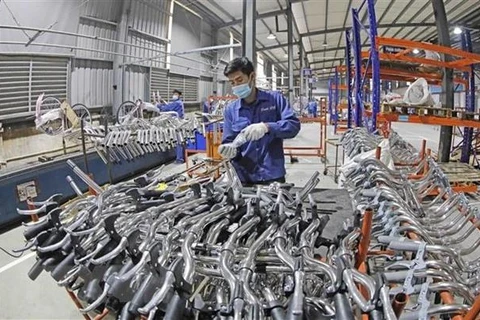
Hanoi (VNS/VNA) – Vietnam’s labour market faces a critical challenge as many low-skilled workers, despite losing their jobs, are reluctant to pursue vocational training programmes aimed at helping them switch careers.
Data from the Hanoi Employment Service Centre reveals that, while unemployment benefits were approved for 8,500 workers in September, only 204 opted to enroll in vocational training.
Deputy Director of the centre, Vu Quang Thanh, explained that when companies cut their workforce, they often focus on reducing low-skilled manual workers, retaining those with higher qualifications.
Despite this, most of the laid-off workers seek unemployment benefits rather than participating in training programmes.
According to Thanh, the current financial support for vocational training is insufficient to attract workers, with training durations often too short to make a significant impact.
Low-skilled workers like Ha Thi No from Bien Hoa city in the southern province of Dong Nai, who was laid off in July after 13 years in the wood industry, say that attending vocational training is not feasible.
No, who now works temporary jobs to make ends meet said: "Learning a new skill might provide job opportunities, but I do not have time to attend training. The extra costs for transportation and meals make it impossible."
Others, like Le Thuan Nam from Bien Hoa city, a former security guard, planned to take a driving course but abandoned the idea due to high costs.
"The driving course costs around 20 million VND (780 USD), far beyond the 9 million (355 USD) support cap," he said.
Nam, like many others, found the lower-cost training options, such as cooking or tailoring, unsuitable for his situation.
Even those interested in vocational training, like Duong Thi Ngoc from Bien Hoa city, are hesitant due to additional expenses.
Ngoc, who considered a four-month make-up course, is struggling financially after losing her job and receiving just 3.5 million VND (138 USD) in monthly unemployment benefits.
Employment experts have called for an overhaul of the vocational training support system.
Deputy Director of the Hanoi Employment Service Centre Vu Thi Thanh Lieu believed that the current support needs to be adjusted to cover transportation and meal allowances to make training programmes more accessible for laid-off workers.
According to Lieu, the support for vocational training is capped at 4.5 million VND for a three-month course and 9 million VND for one lasting from three to six months. However, the cost of living and specialised courses can often exceed these limits, making it difficult for unemployed workers to retrain and find new employment.
The Ministry of Labour, Invalids and Social Affairs is already working on revisions to the Employment Law, with proposals to increase the support for vocational training, expand the scope to improve workers' skills, and provide support even to those not receiving unemployment benefits.
According to ministry data, from 2015 to 2023, only 256,350 people nationwide received vocational training support, averaging just 28,483 people annually.
Experts suggest that to make vocational training more effective, unemployment benefits should be raised to 75% of the average salary from the six months before individuals lost their jobs, along with increased training support and extended course durations.
The revisions to the Employment Law are expected to provide much-needed adjustments to help laid-off workers transition into new careers, but for now, many continue to face barriers in accessing vocational training opportunities./.






















